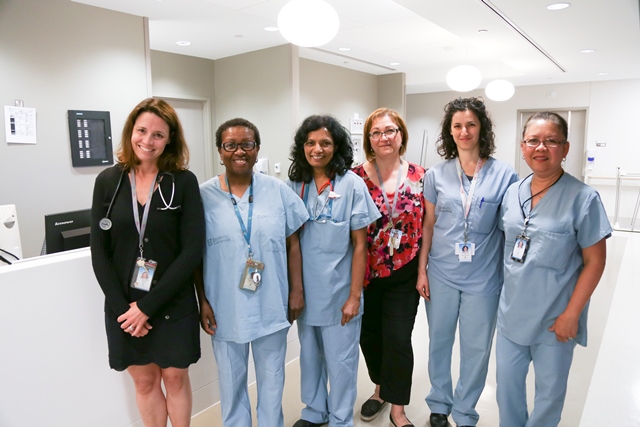Where does a patient go when their needs are too complex for a community or family physician but may not require inpatient hospitalization or a trip to the emergency room?
Since 2012, the Acute Ambulatory Care Unit (AACU) at Women’s College Hospital (WCH) has been helping patients in this very situation by providing urgent assessment, investigation and management for patients with new or chronic medical illnesses.
“Our goal is to prevent long trips to the emergency room and lengthy inpatient hospitalizations,” says Patrizia DiRaimo, clinical manager of the AACU, WCH. “If we can provide patients with the care they need within 18 hours in the AACU, then we can reduce the time they spend at a hospital and lessen the pressure on other local healthcare facilities.”
The AACU team works with patients dealing with conditions such as COPD, asthma, heart failure and those who need IV antibiotics or rapid diagnostic workup for a new medical problem. The unit operates 24 hours a day, from Monday to Friday and is staffed by several nurses and a physician who specializes in general internal medicine. The AACU team has access to a wide range of medical testing such as radiology tests, non-invasive cardiac testing, pulmonary function tests, laboratory requests and more. They can also arrange for urgent referrals to other specialists.
To access the AACU, patients must be referred by a physician, be medically stable and able to come for outpatient followup. If a patient is required to stay overnight, the healthcare team at the AACU will often speak to them about personal items to make their stay more comfortable, such as their own toiletries and reading materials. Patients are also able to bring specialized dietary items such as gluten-free and/or lactose-free foods if needed.
Since patients may be in the unit for longer than just a couple of hours, the AACU team places a strong emphasis on ensuring that communication is as easy as possible for non-English speaking patients. Program pamphlets are offered in Portuguese, Italian and Cantonese – languages spoken by some of the clinic’s largest patient populations. The team also has access to translation services for other languages.
“In addition to providing the right kind of care in the right timeframe, we want to make sure our patients are comfortable and feel safe,” says DiRaimo. “As our patient population evolves, we are ready to evolve with them.”
To learn more about the AACU’s services, please click here.

